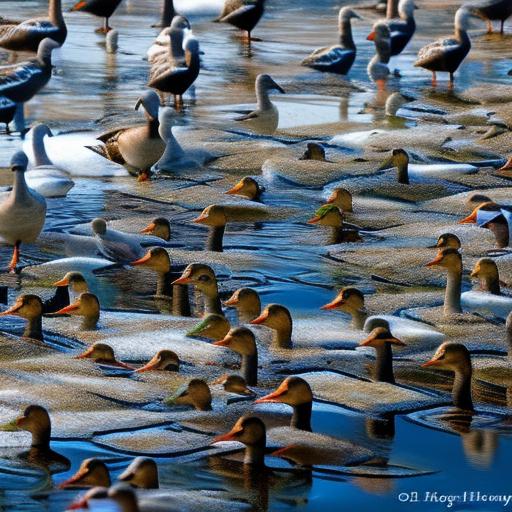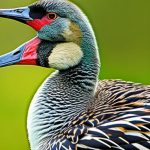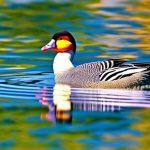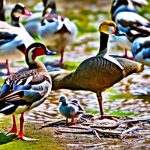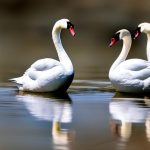Pollution is a global issue that affects various aspects of our environment, including wildlife. Geese, in particular, are highly impacted by pollution and face numerous challenges as a result. Geese play a crucial role in the ecosystem as they help maintain the balance of wetland habitats and contribute to seed dispersal. They are also an important part of the food chain, serving as prey for larger predators. Therefore, understanding the impact of pollution on geese is essential for the overall health and stability of our ecosystems.
Key Takeaways
- Pollution reduces availability of food and habitat for geese
- Polluted water and air cause health problems for geese
- Pollution increases risk of predation for geese
- Pollution changes migration patterns and breeding habits of geese
- Pollution negatively affects reproductive success and genetic diversity of geese
Reduced Availability of Food and Habitat
One of the major impacts of pollution on geese is the reduced availability of food and habitat. Pollution, such as chemical runoff from agricultural practices and industrial waste, contaminates water bodies and destroys the natural vegetation that geese rely on for food. This leads to a scarcity of nutritious food sources for geese, which can result in malnutrition and weakened immune systems.
Additionally, pollution can degrade wetland habitats, making them unsuitable for geese to nest and raise their young. Wetlands are essential breeding grounds for geese, providing them with shelter and protection from predators. When these habitats become polluted, geese are forced to find alternative nesting sites that may not offer the same level of safety and resources.
Health Problems Caused by Polluted Water and Air
Polluted water and air have detrimental effects on the health of geese. Water pollution can lead to the accumulation of toxins in their bodies, causing liver damage, reproductive issues, and weakened immune systems. Pesticides and herbicides used in agriculture can contaminate water bodies, making them toxic for geese to drink from or swim in.
Air pollution also poses a significant threat to geese. Industrial emissions and vehicle exhaust release harmful pollutants into the air, which can be inhaled by geese during their daily activities. This can lead to respiratory problems, decreased lung function, and increased susceptibility to diseases.
Increased Risk of Predation
Pollution can increase the risk of predation for geese. When water bodies become polluted, it attracts scavengers and predators that feed on the contaminated organisms. Geese, in search of food, may unknowingly expose themselves to these predators, putting them at a higher risk of being hunted.
For example, polluted water bodies can attract larger predators such as coyotes and foxes, which are known to prey on geese. These predators take advantage of the compromised health and weakened immune systems of geese due to pollution, making them easy targets.
Changes in Migration Patterns and Breeding Habits
Pollution can disrupt the natural migration patterns and breeding habits of geese. Geese rely on environmental cues, such as changes in temperature and food availability, to determine when to migrate and where to breed. However, pollution can alter these cues and confuse geese, leading to changes in their behavior.
For instance, pollution can affect the timing of plant growth and the availability of food sources along migration routes. This can cause geese to arrive at their breeding grounds too early or too late, resulting in reduced reproductive success. Pollution can also disrupt the communication signals between geese during migration, leading to disorientation and separation from their flocks.
Negative Effects on Reproductive Success

Pollution has negative effects on the reproductive success of geese. Contaminated water bodies can impact the fertility of geese by affecting their hormone levels and reproductive organs. This can result in reduced egg production and hatching success rates.
Furthermore, pollution can lead to the accumulation of toxins in the eggs of geese. When these eggs hatch, the young goslings may be born with deformities or weakened immune systems, making them more vulnerable to diseases and predation.
Decreased Genetic Diversity
Pollution can also decrease the genetic diversity of geese populations. When pollution affects the reproductive success of geese, it can lead to a decrease in the number of individuals and limit the gene pool available for breeding. This can result in inbreeding and genetic abnormalities, which can further weaken the overall health and resilience of the population.
Certain pollutants, such as heavy metals and pesticides, can also cause genetic mutations in geese. These mutations can be passed down to future generations, leading to long-term negative effects on the genetic diversity and viability of the population.
Threat of Extinction for Endangered Species
Pollution poses a significant threat of extinction for endangered species of geese. Endangered species, such as the Hawaiian goose (Nene) and the Red-breasted goose, are already facing numerous challenges due to habitat loss and hunting. Pollution further exacerbates these threats by compromising their health and reproductive success.
For example, the Hawaiian goose is highly susceptible to pollution due to its limited habitat range on the Hawaiian Islands. Pollution from urban development and agricultural practices has led to a decline in their population, pushing them closer to extinction.
Economic and Ecological Consequences of Losing Geese
Losing geese can have significant economic and ecological consequences. Geese contribute to the ecosystem by dispersing seeds through their droppings, helping to maintain plant diversity and promote healthy vegetation growth. They also serve as prey for larger predators, contributing to the balance of predator-prey relationships.
From an economic perspective, geese are a valuable resource for ecotourism and recreational activities such as birdwatching. Many people travel to observe and photograph geese in their natural habitats, generating revenue for local communities and supporting conservation efforts.
The Importance of Taking Action to Reduce Pollution and Protect Geese
It is crucial to take action to reduce pollution and protect geese from further harm. Implementing stricter regulations on industrial waste disposal, promoting sustainable agricultural practices, and investing in renewable energy sources are some of the steps that can be taken to reduce pollution.
Individuals can also make a difference by reducing their own carbon footprint, supporting organizations that work towards environmental conservation, and spreading awareness about the impact of pollution on geese. By taking action, we can help protect geese and ensure the health and stability of our ecosystems for future generations.
Pollution has a significant impact on geese, affecting their food availability, habitat, health, predation risk, migration patterns, breeding habits, reproductive success, genetic diversity, and overall survival. Losing geese can have economic and ecological consequences, highlighting the importance of taking action to reduce pollution and protect these vital species. By implementing stricter regulations, promoting sustainable practices, and raising awareness about the issue, we can work towards a cleaner environment and a healthier future for geese and other wildlife.
If we continue to pollute our environment, the consequences for wildlife can be devastating. Geese, in particular, are highly susceptible to the negative effects of pollution. From contaminated water sources to toxic food supplies, these majestic birds face numerous challenges. To learn more about the impact of pollution on geese and how we can mitigate these risks, check out this informative article on Poultry Wizard. It’s crucial that we take immediate action to protect our natural habitats and ensure the well-being of all creatures that call them home.
FAQs
What is pollution?
Pollution is the presence or introduction into the environment of substances or things that have harmful or poisonous effects.
How does pollution affect geese?
Pollution can affect geese in various ways, including damaging their habitat, contaminating their food sources, and causing health problems.
What are the health problems that geese can face due to pollution?
Geese can face health problems such as respiratory issues, reproductive problems, and weakened immune systems due to pollution.
What are the consequences of habitat destruction for geese?
Habitat destruction can lead to a decrease in the population of geese, as they may not have enough space to breed and raise their young.
How does pollution affect the food sources of geese?
Pollution can contaminate the food sources of geese, such as water and plants, which can lead to health problems and even death.
What can be done to prevent pollution from affecting geese?
Preventing pollution can be done by reducing the use of harmful chemicals, properly disposing of waste, and promoting sustainable practices. Additionally, protecting and restoring natural habitats can help ensure the survival of geese and other wildlife.
Meet Walter, the feathered-friend fanatic of Florida! Nestled in the sunshine state, Walter struts through life with his feathered companions, clucking his way to happiness. With a coop that’s fancier than a five-star hotel, he’s the Don Juan of the chicken world. When he’s not teaching his hens to do the cha-cha, you’ll find him in a heated debate with his prized rooster, Sir Clucks-a-Lot. Walter’s poultry passion is no yolk; he’s the sunny-side-up guy you never knew you needed in your flock of friends!

